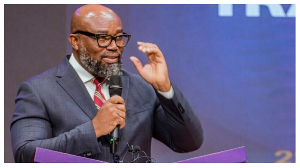The Global Media Foundation (GloMeF), a non-governmental organisation with funding from Plan International, Global Affairs Canada and Women’s Voice and Leadership-Ghana, has launched a new initiative dubbed “Women Empowerment and Enterprise Development”.
The initiative will directly benefit 500 vulnerable and marginalized women in six communities such as Abesim, Sunyani, Atronie, Nwawasua and Antwikrom in the Sunyani Municipality in the Bono Region.
The five months project seeks to train women in basic entrepreneurship and vocational skills, promote women inclusion in decision-making and advocate gender-sensitive and equity at workplaces.
The launch brought together leaders of various groups such as market women, youth associations, civil society organisations, religious bodies, Persons Living With Disabilities (PLWDs) and Commission on Human Rights and Administrative Justice (CHRAJ) among others.
Project objectives
The project, which is being sponsored by the Plan International Ghana, Global Affairs Canada and Women’s Voice and Leadership-Ghana, is expected to develop women businesses and improve entrepreneurship skills among 500 women by end of June 2021.
It also expected to increase the financial capacities of women through education and skills training programmes of 200 women in soap making and link them to credit facilities to acquire loans to enable them reduce poverty.
In addition, the project is to empower 50 young women in women’s rights advocacy skills in six communities in the municipality to serve as advocates of sexual and gender based violence (SGBV) against women to reduce all forms of cultural and social norms that impede women’s business development at the end of the project.
Activities
The activities include skills training workshop on mushroom production for 100 women, organisation of two capacity building training workshops on vocational skills for 100 women in Income Generating Activity (IGA), through soap preparation.
Others are capacity building training workshops on business development and entrepreneurship skills for 150 women on basic marketing, networking and advance sale techniques and workshops on women’s right advocacy skills and leadership development skills for 50 women to empower them to take leadership and advocacy roles among others.
COVID-19 pandemic
Speaking during the launch, the Project Director of the GLOMEF, Madam Christiana Korankye, said the project was necessary because of the COVID-19 pandemic that had posed a major disruption to economic activities of women in the municipality.
According to her, some women lost their capital, savings and business to the COVID-19 pandemic and explained that the pandemic and its consequences were having a significant impact on people’s lives, especially women, girls, underserved and vulnerable groups in the society.
Madam Korankye explained that the economic challenges during the pandemic posed a serious threat on women’s business, especially market women as they were relocated and slow trading activities, which necessitated the support to help them revive their businesses.
She said the pandemic brought transportation, local market activities and other economic ventures to a halt in the municipality, with Informal sector businesses, such as drinking and chop bars, small retail shops, hairdressers, and taxi drivers saw a reduction in customers.
Madam Korankye said outbreaks or pandemics affect women and men differently and explained that pandemics make existing gender inequalities for women and girls worse, and could impact how they receive treatment and care.
“In times of crisis, women and girls also face increased risks of other forms of gender-based violence including sexual exploitation and abuse”, she stated and explained that sexual and reproductive health and rights was a significant public health issue that requires high attention during pandemics.
Women empowerment
Madam Korankye, said the project sought to empower women to overcome all forms of sexual and gender-based violence and empower vulnerable women economically by providing training in IGA such as soap preparation and mushroom farming.
She said though there were increasing numbers of female entrepreneurs, they face many constraints that affect the survival and growth of their businesses.
Madam Korankye said most women face limitations in business such as management inability, financial illiteracy, lack of creativity and dynamism, self-confidence and an appetite for risk.
Regional News of Saturday, 17 April 2021
Source: Edmund Gyebi













